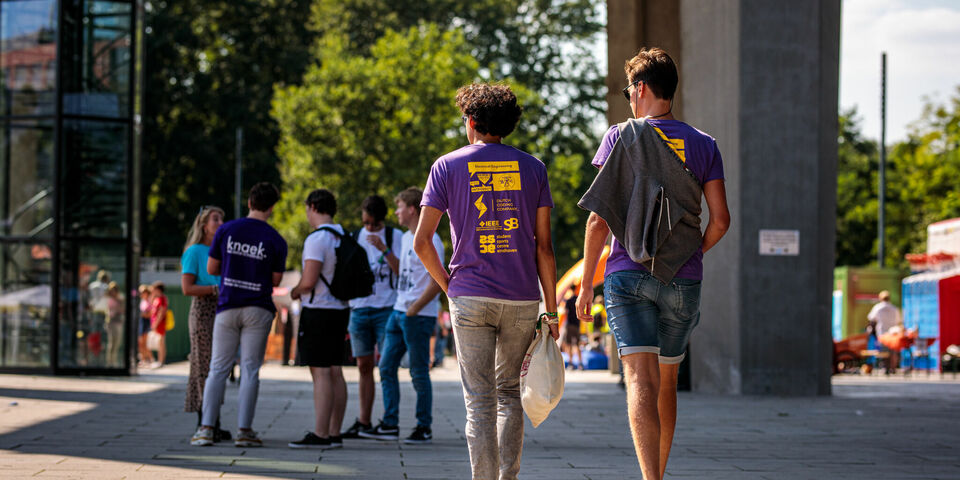Intro kicks off with “Never Have I Ever” about social safety
What happens when you put thousands of young people together who are about to embark on a whole new life? It turns into one big party, but it is also a perfect breeding ground for all sorts of situations that can lead to feelings of social unsafety. In order to counteract that, several initiatives have been created for this Intro, including workshops for mentors and a game designed to encourage the brand-new students to talk to each other about personal boundaries.
A socially safe Intro: that is the idea behind a modified version of the game “Never Have I Ever”. Berkay Türk, who spends half his time as project manager at ESA working on social safety, developed the game together with Diversity Officer Lara Hofstra. For those who are not familiar with the original rules: one person in the group gives an example of something they have never done before; those who have must drink a shot or sip of alcohol. The Intro game, however, does not involve any actual alcohol and the proposed statements are not about exciting experiences, but about socially desirable behavior. For example, the brand-new students will be presented with statements such as “Never have I ever asked for someone’s consent regarding physical contact” and “Never have I ever told someone that a joke crossed my personal line.”
Personal boundaries
The game will help first-year students define their personal boundaries and find out where other people’s boundaries lie, says Türk. “The thing about personal boundaries is that they are different for everyone. That's why it’s so important to talk about them with each other and to make agreements of sorts about how to deal with them.” He believes that talking about this results in more understanding for each other, which in turn contributes to a socially safe situation. The game also addresses situations that are very relevant to the introduction week, allowing students to immediately apply what they have learned. “For example, one of the statements is: 'Never have I ever asked someone for permission to post a picture of them on social media.' You can bet that a lot of pictures will be taken and shared during the Intro.”
Türk realizes that a 30-minute game is not going to change the world, but if it gets students talking about social safety, he considers that a win. To make sure that the game is successful, Intro parents are trained as game leaders during the preparatory meeting that takes place the weekend before the Intro. There, they learn how to get the conversation going in a positive way. This is part of a more extensive social safety training, which also covers the role of mentors as active bystanders and topics such as diversity and inclusion. In addition to the mentors, Confidential Contact Persons (CCPs) will be on standby all week to provide additional support. They will be in the main hall of Atlas from 11 a.m. to 8 p.m. each day. The new students will also receive a social safety-themed foldable water bottle with a logo on it, which Türk hopes will remind them to drink enough water (which can also contribute to a socially safe situation, he adds with a wink).
Extra emphasis
The extra emphasis on social safety this year is simply a sign that the university is making improvements in that area, according to Türk. “And hopefully we will do even better next year. To that end, it’s not about how much you do, but about what you do. The game and the training provided to mentors contribute to the culture of dialogue that we want to achieve at the university. That’s a new element which I truly expect will improve the situation.” He views the creation of a socially safe situation as an ongoing process without an end, which keeps adapting to the needs of students and to society.
This comes with constant changes, which may feel uncomfortable. For example, not everyone is used to asking for someone’s consent to touch or kiss them. “You can help these people by giving them examples. I happened to watch a TV show yesterday where two characters got intimate and one asked the other for permission to proceed. That wasn’t uncomfortable at all. How you ask for consent is up to you. It doesn’t have to kill the mood.” Still, Türk understands that change can cause a certain amount of discomfort. But in order for things to improve, we need change, he says. “It may not always be easy, but it’s necessary.”



Discussion